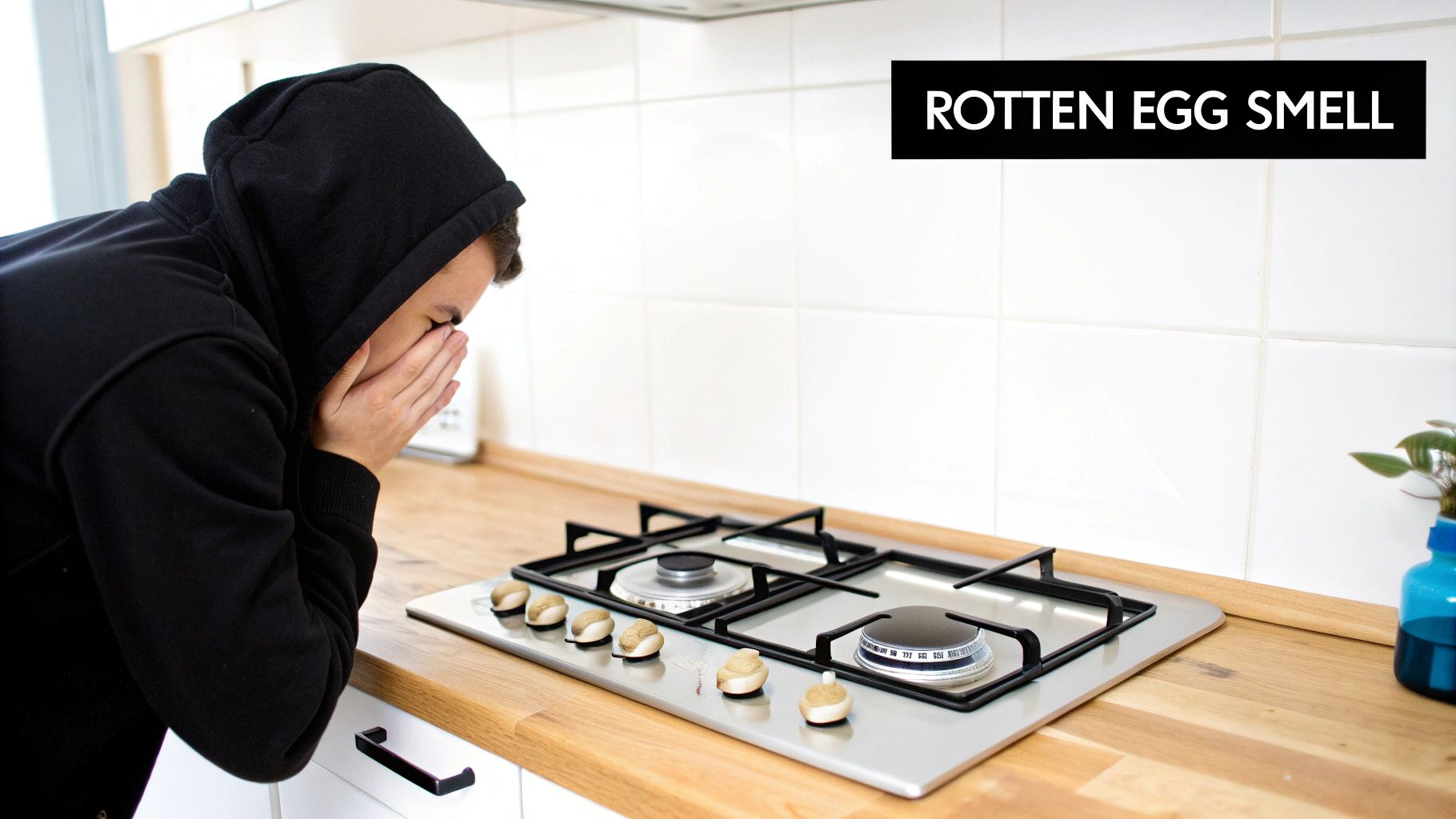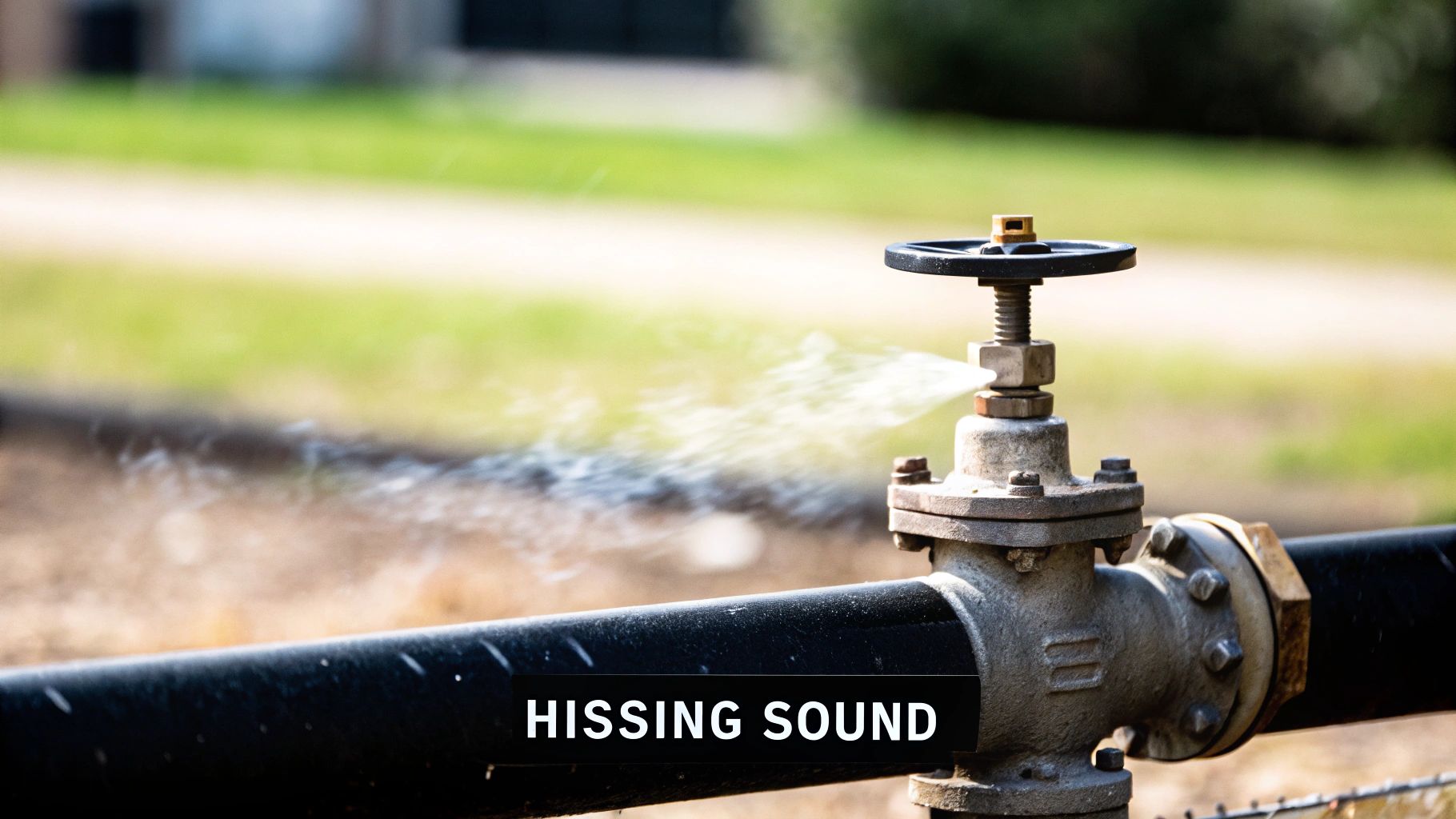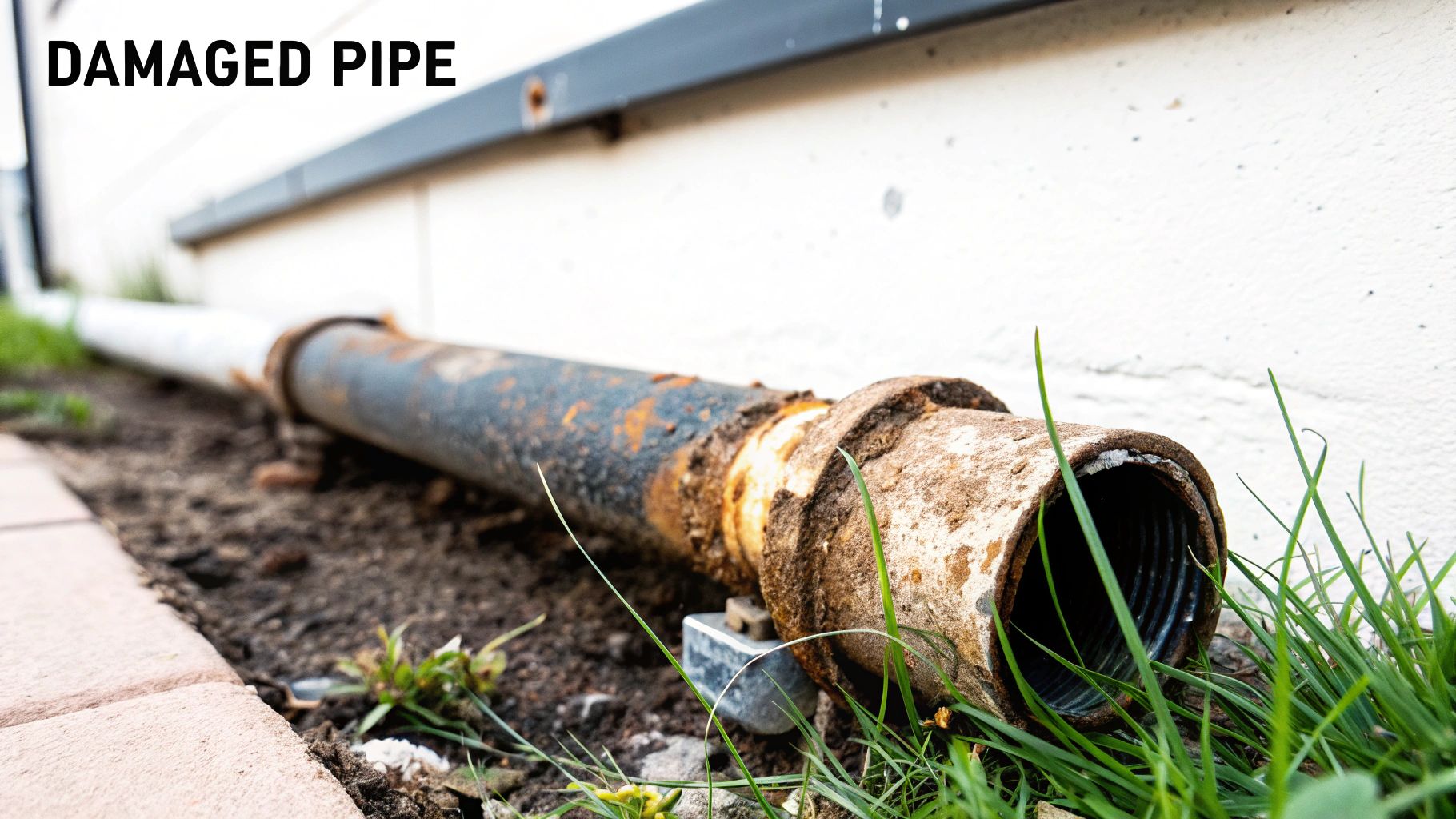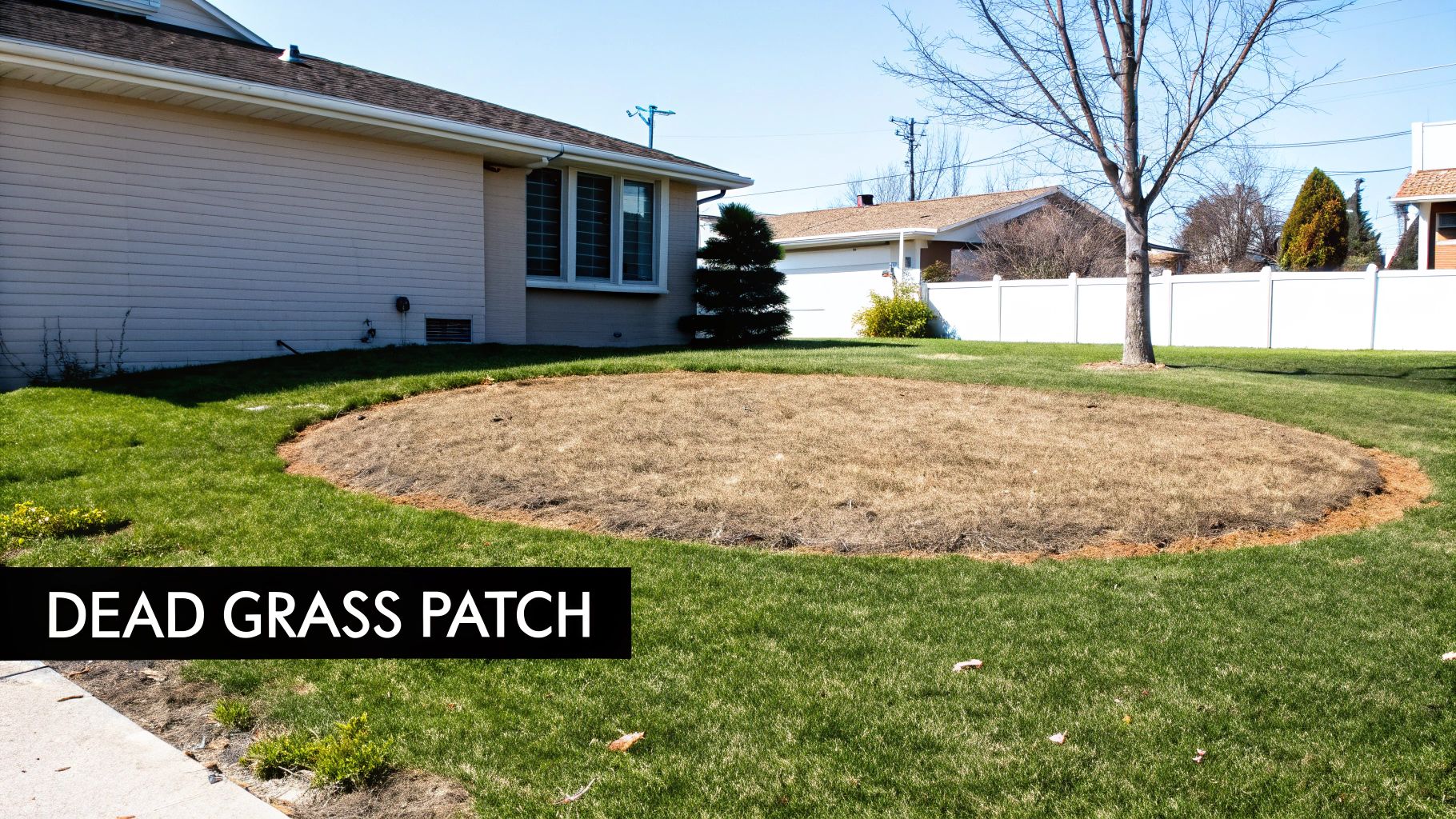Signs of a Gas Leak: 5 Quick Clues for Your Home
- Luke Yeates
- Nov 7, 2025
- 14 min read
Natural gas is an efficient and reliable energy source, powering everything from our central heating during a brisk Eastbourne winter to the hob we use for a family meal. While incredibly useful, its convenience is paired with a critical need for safety. A gas leak, though uncommon, presents a significant hazard to your property and, more importantly, your family's well-being. Understanding the early warning signals is your most vital line of defence against potential danger.
Many people only know to look for a 'rotten egg' smell, but other indicators are far more subtle and easily overlooked. Some signs of a gas leak can be mistaken for everyday household problems, making it crucial to be properly informed. This guide is designed to empower you, the Eastbourne homeowner or landlord, by detailing seven crucial signs of a gas leak. We will explore each indicator with practical, actionable advice, explaining what to look for and the immediate steps you must take. Knowing when to evacuate and call in certified Gas Safe registered engineers, like the experienced team at Harrlie Plumbing and Heating, can make all the difference in keeping your home safe. Let's delve into the signs you need to recognise.
1. Rotten Egg or Sulfur Smell: The Unmistakable Warning
This is often the first and most critical of all the signs of a gas leak that homeowners notice. Natural gas, in its raw state, is completely odourless and invisible. To make it detectable, utility suppliers add a potent chemical called mercaptan. This additive gives the gas a distinct and unpleasant smell, often compared to rotten eggs, sulphur, or boiled cabbage, ensuring even the smallest leak can be noticed quickly.

The presence of this smell is your built-in safety alarm, designed to alert you to danger long before gas levels become hazardous. Its effectiveness relies on you recognising it and acting immediately.
Real-World Scenarios in Eastbourne
This distinct odour has alerted many local residents to potential danger. For instance, a homeowner in Old Town, Eastbourne, recently detected a faint rotten egg smell near their boiler. Thinking quickly, they called our team at Harrlie Plumbing and Heating, and we discovered a corroded gas pipe fitting that was slowly leaking. Similarly, after a new cooker installation in a Hampden Park home, the residents detected the smell, indicating a connection wasn't properly tightened and required an immediate fix from a professional.
What to Do Immediately
If you detect this smell, you must treat it as a genuine emergency every single time. Your swift action is crucial for safety.
Do Not Create a Spark: Immediately stop what you are doing. Do not switch any lights or electrical appliances on or off. Do not use your mobile phone or landline inside the property.
Ventilate and Evacuate: Open doors and windows to help disperse the gas as you make your way out of the building. Do not delay your exit.
Call for Help Safely: Once you are outside and a safe distance from the property, call the National Gas Emergency Service on 0800 111 999. Afterwards, contact a certified Gas Safe engineer. The rapid response team at Harrlie Plumbing & Heating is equipped to handle such emergencies in the Eastbourne area, ensuring the issue is located and repaired safely.
Alert Others: If you live in a connected property, such as a terraced house or a block of flats, inform your neighbours of the potential danger.
2. Hissing or Whistling Sounds: An Audible Alarm
Beyond smell, your sense of hearing can be a powerful tool for identifying potential signs of a gas leak. If you hear a distinct hissing, whistling, or blowing sound near a gas line or appliance, it’s a strong indication that pressurised gas is escaping through a small hole, crack, or faulty connection. This sound is created by the gas being forced through a restricted opening, much like air escaping from a punctured tyre.

This audible warning is particularly important because it can be detected even if the smell of gas hasn't accumulated yet, especially in well-ventilated areas or outdoors. The intensity of the hiss often correlates with the severity of the leak; a louder sound typically means a larger or higher-pressure leak.
Real-World Scenarios in Eastbourne
Our engineers at Harrlie Plumbing and Heating have responded to call-outs based on sound alone. For example, a restaurant owner in the Sovereign Harbour area heard a faint but persistent whistling sound coming from behind a large commercial water heater. This prompted an emergency call, revealing a fractured gas supply line that required immediate attention. In another case, a homeowner in Roselands was alerted by a hissing noise near their gas meter box outside, leading to our swift repair of a deteriorating seal.
What to Do Immediately
Hearing a hissing sound is just as serious as smelling gas and requires the same urgent response. Your priority is to avoid any source of ignition.
Pinpoint but Don't Linger: If you can safely do so without getting too close, try to note the general area where the sound is coming from. However, do not spend time trying to find the exact source.
No Flames or Sparks: Do not use lighters, matches, or any electrical devices, including light switches and mobile phones, as they can create a spark.
Evacuate and Ventilate: Immediately open doors and windows on your way out of the property to help disperse the gas. Get everyone out of the building.
Make the Call from a Safe Location: Once you are a safe distance away from the property, call the National Gas Emergency Service at 0800 111 999. Then, for a professional assessment and repair in the Eastbourne area, contact a Gas Safe registered team like Harrlie Plumbing & Heating. For more in-depth advice, read our complete guide on how to detect gas leaks.
3. Visible Damage to Gas Lines or Connections
While your nose might be the first line of defence, your eyes can often spot trouble before a leak even begins. This is one of the most proactive signs of a gas leak you can identify. Physical deterioration, corrosion, cracks, or other damage to visible gas pipes and connections compromises the integrity of the system. A simple visual inspection can reveal structural problems that, if left unaddressed, will inevitably lead to a dangerous leak.

Gas pipes are built to be durable, but they aren't invincible. Age, moisture, and accidental impacts can cause damage over time. Spotting issues like significant rust, dents in pipes, or cracked flexible connectors gives you a crucial opportunity to act before gas starts escaping.
Real-World Scenarios in Eastbourne
Visual checks have prevented numerous gas emergencies across the local area. During a routine boiler service in a Meads property, one of our Harrlie Plumbing & Heating engineers noticed significant corrosion on the gas connection to the unit, a direct result of a slow, long-term water drip from an adjacent pipe. Similarly, a landlord in Sovereign Harbour preparing a property for new tenants spotted a badly dented external gas pipe, likely caused by a previous vehicle impact, prompting an immediate safety inspection and repair.
What to Do Immediately
If you see any visible damage to a gas line or fitting, it's essential to have it professionally assessed without delay. This isn't a DIY repair job; the risks are far too high.
Perform Regular Visual Checks: Once a quarter, take a few minutes to inspect any visible gas pipes in your home, such as those in the basement, utility room, or leading to appliances like your hob or boiler.
Know What to Look For: Keep an eye out for rust, corrosion (green or white powdery residue), cracks, dents, and brittle-looking flexible connectors. Check that all visible connections appear secure.
Document and Don't Disturb: If you find something concerning, take a photo for your records. Do not attempt to tighten, repair, or move the damaged pipe yourself, as this could worsen the problem or cause a sudden, major leak.
Call a Professional: Contact a certified Gas Safe engineer to inspect the damage. The experienced team at Harrlie Plumbing & Heating can provide a thorough assessment and carry out the necessary, safe repairs to ensure your system's integrity is fully restored.
4. Dead or Dying Vegetation
While many signs of a gas leak are noticed inside the home, some of the most telling indicators can appear in your garden. If you notice patches of dead grass, wilting shrubs, or dying vegetation in an otherwise healthy lawn, it could be a sign of an underground gas leak. Natural gas escaping from a buried pipe displaces oxygen in the soil, effectively suffocating plant roots and preventing them from absorbing essential nutrients and water.

This environmental warning sign is particularly useful for identifying issues with external supply lines that you might not otherwise detect. The escaping gas starves the surrounding ecosystem, leaving a clear visual clue right on the surface.
Real-World Scenarios in Eastbourne
This subtle sign has helped prevent more serious issues across East Sussex. For example, a resident in the Roselands area of Eastbourne noticed a distinct, unexplained yellowing stripe across their front lawn that worsened over a few weeks, despite regular watering. It turned out to be directly above the path of their main gas supply line, which had developed a small fracture due to ground settlement. Similarly, a property manager for a block of flats in Meads noticed a recurring issue with dying shrubs near the building's gas meter, prompting an investigation that uncovered a slow leak from an aging underground pipe.
What to Do Immediately
Observing this sign requires a different, but equally urgent, approach. While the immediate danger of ignition is lower outdoors, the leak still needs to be addressed promptly.
Document and Observe: Take photos of the affected vegetation. Note if the dead patch is forming a line or is concentrated in a specific area, especially if it corresponds with the known location of your gas line.
Avoid Ignition Sources Nearby: Keep any sources of ignition, such as lawnmowers, strimmers, or barbecues, away from the suspicious area. Do not attempt to dig in the area to investigate the problem yourself.
Call for Professional Help: From a safe location, call the National Gas Emergency Service on 0800 111 999 to report a suspected outdoor leak. They will investigate the external supply network.
Arrange a Safety Check: For peace of mind and to check the pipes on your property, contact a certified engineer. The team at Harrlie Plumbing & Heating can perform a thorough gas safety check to ensure all your pipework, both internal and external, is secure and free from leaks.
5. Bubbles in Standing Water or Foam
While less common than an unusual smell, this is one of the more definitive visual signs of a gas leak, particularly for underground or external pipes. When pressurised gas escapes from a line buried in moist soil or located beneath a puddle, it will bubble up through the water, creating a noticeable disturbance or a foamy patch on the surface.
This phenomenon occurs because the escaping gas displaces the water as it seeks the path of least resistance to the open air. Spotting this can pinpoint the exact location of an outdoor leak, which might otherwise go completely undetected until it becomes a much larger problem.
Real-World Scenarios in Eastbourne
This specific sign has helped identify serious issues in the local area. After a heavy downpour, a client of ours in the Roselands area of Eastbourne noticed persistent bubbling in a puddle near their external gas meter. We were able to confirm it was a fractured underground supply pipe. In another instance, a property manager in Polegate saw a strange foam-like substance forming in a waterlogged garden bed near a gas line, leading to the discovery of a significant leak.
What to Do Immediately
Seeing unexplained bubbles in standing water near gas infrastructure requires the same urgent response as smelling gas. It is a clear visual alarm bell.
Secure the Area: Keep everyone, including pets, away from the bubbling location. Do not attempt to cover the area or stop the bubbles yourself.
Avoid Ignition Sources: Even though you are outside, stay vigilant. Do not use lighters, smoke, or start any engines like a lawnmower or car nearby.
Call for Help from a Safe Place: Move a safe distance away from your property before making any calls. First, ring the National Gas Emergency Service at 0800 111 999. They will provide immediate guidance.
Arrange a Professional Inspection: Once the emergency service has declared the area safe, it's crucial to have a Gas Safe registered engineer assess and repair the underlying issue. The certified team at Harrlie Plumbing & Heating has the expertise to locate and safely repair external gas line faults across Eastbourne and surrounding areas.
6. Physical Symptoms and Health Effects
While many signs of a gas leak are external, some of the most serious warnings come from within your own body. Exposure to natural gas in an enclosed space displaces oxygen, leading to a range of physical symptoms that can act as a crucial alert. If the usual indicators are missed, unexplained health issues affecting multiple people in a household can be the final, critical clue.
These symptoms, which include dizziness, persistent headaches, nausea, fatigue, and even difficulty breathing, occur because your body isn't getting the oxygen it needs. The symptoms typically improve quickly once you move into fresh air, which is a key indicator that the indoor environment is the problem.
Real-World Scenarios in Eastbourne
These subtle health warnings have served as lifesavers for local families. In one case in Sovereign Harbour, a family reported experiencing simultaneous, recurring headaches and dizziness over several days. It wasn't until their pet dog also became unusually lethargic that they suspected an environmental cause, leading to the discovery of a slow leak from their gas fireplace. Similarly, an elderly couple in Meads felt unusually tired and nauseous, symptoms they initially dismissed as a common bug, but were later traced back to a faulty gas cooker connection.
What to Do Immediately
Recognising these symptoms as a potential gas leak is vital. Your health is the most sensitive detector you have.
Trust Your Symptoms: If you or multiple members of your household suddenly feel unwell with these symptoms, especially if they improve when you go outside, consider a gas leak a strong possibility.
Evacuate to Fresh Air: Immediately get everyone, including pets, out of the property and into the fresh air.
Call for Emergency Help: From a safe location outside, call the National Gas Emergency Service at 0800 111 999. If symptoms are severe (such as loss of consciousness or severe breathing trouble), call 999 for medical assistance first.
Seek Professional Inspection: Do not re-enter your home until it has been declared safe. Once the immediate emergency is handled, you will need a Gas Safe registered engineer to find and repair the source. The expert team at Harrlie Plumbing & Heating can provide a rapid and thorough inspection to ensure your home is secure. These symptoms are also similar to carbon monoxide exposure; you can learn more about the crucial safety tips for a carbon monoxide alarm.
7. Abnormal Appliance Behavior or Pilot Light Issues
Your gas appliances are reliable indicators of your home's gas supply health. A sudden change in their performance is one of the more subtle but equally critical signs of a gas leak. A leak can disrupt the pressure and flow of gas, causing appliances like your boiler, cooker, or water heater to behave erratically. This isn't just an inconvenience; it's a clear warning that something is wrong with the gas delivery system.
Problems like a pilot light that keeps extinguishing, a weak or flickering flame, or a flame that is yellow or orange instead of a crisp blue, all point to an issue. These symptoms signal that the appliance isn't receiving the correct amount of gas, potentially due to a leak somewhere along the line.
Real-World Scenarios in Eastbourne
We've seen this issue manifest in several Eastbourne homes. A family in Sovereign Harbour noticed their gas water heater's pilot light would go out almost daily. An inspection by a Harrlie Plumbing & Heating engineer revealed a small, corroded joint in the gas pipe behind the unit. In another case, a restaurant in the town centre reported their gas hob was producing lazy, yellow flames, which led to the discovery of a significant leak in their main supply line, averting a serious incident.
What to Do Immediately
Recognising these appliance malfunctions as potential gas leak warnings is crucial for maintaining a safe home. Pay close attention to how your appliances operate.
Observe the Flame: A healthy gas flame should be steady and blue. A yellow, orange, or weak flame indicates incomplete combustion, which could be caused by a supply issue or an appliance fault.
Note Any Changes: If your furnace starts cycling on and off irregularly or your gas hob struggles to ignite, document these changes. If multiple appliances start acting up at once, a systemic gas supply problem is highly likely.
Seek Professional Help: Do not attempt to fix gas appliance connections or pilot lights yourself. These are often complex systems requiring expert knowledge. While understanding how to troubleshoot minor issues, like resolving gas range igniter issues, is useful, persistent problems demand a professional.
Schedule an Inspection: Contact a Gas Safe registered engineer immediately to inspect your appliances and gas lines. The team at Harrlie Plumbing & Heating can diagnose the root cause, whether it's a simple appliance fault or a dangerous leak. Regular maintenance, such as an annual gas safety check, is the best way to prevent these issues from occurring.
7-Point Gas Leak Signs Comparison
Warning Sign | Implementation Complexity 🔄 | Resource Requirements ⚡ | Expected Outcomes 📊 | Ideal Use Cases 💡 | Key Advantages ⭐ |
|---|---|---|---|---|---|
Rotten Egg or Sulfur Smell | Minimal — passive, no setup | None | Immediate detection of leaks at low concentrations | Indoor/near appliances; early hazard alert | Highly distinctive; effective at low levels |
Hissing or Whistling Sounds | Low — requires focused listening | None (quiet environment helps) | Localizes active leaks; indicates urgency | Around fittings, meters, appliances | Helps pinpoint source; no equipment |
Visible Damage to Gas Lines or Connections | Moderate — regular inspections; may need pros | Basic inspection tools; professional assessment for repairs | Prevents leaks by identifying faults early | Routine home/building inspections; exposed pipes | Preventative; visual confirmation of issues |
Dead or Dying Vegetation | Low — observational monitoring | None; mapping tools helpful | Indicates underground leaks and leak route | Rural properties; buried/older lines | Reveals hidden underground leaks continuously |
Bubbles in Standing Water or Foam | Low–Moderate — check wet areas | Water presence required; camera for documentation | Clear visual confirmation and precise location | After rain near meters, gutters, puddles | Precise location; unambiguous visual evidence |
Physical Symptoms and Health Effects | Low (detection) — diagnosis complex | Medical attention if severe; monitoring | Signals significant accumulation; health risk | Enclosed spaces where multiple people affected | Immediate biological alert prompting evacuation |
Abnormal Appliance Behavior or Pilot Light Issues | Moderate — appliance checks, possible pro | Knowledge of normal operation; technician service | Indicates pressure/delivery problems; may precede leaks | Multiple appliances failing or flame changes | Early warning of delivery issues; prompts inspection |
Your Next Step: Taking Action and Ensuring Your Peace of Mind
Navigating the responsibilities of home ownership means being prepared, and few things are as critical as knowing how to respond to the signs of a gas leak. Throughout this guide, we've explored the diverse indicators that your gas system may be compromised. From the classic sulfurous smell and distinct hissing sounds to more subtle clues like inexplicably dying houseplants or a pilot light that refuses to stay lit, each sign is a vital communication from your home that requires immediate and decisive action.
The most important takeaway is to trust your senses and act with urgency. A suspected gas leak is not a time for hesitation. Your family's safety is paramount, and the protocol is clear: evacuate the premises without using any electrical switches or mobile phones, and call the National Gas Emergency Service from a safe location. This immediate response protocol is non-negotiable and can be a life-saving reflex. In extreme cases where a gas leak poses an immediate and severe danger, understanding how to safely evacuate your premises is crucial. Consider learning about creating a UK fire evacuation plan to ensure everyone knows how to get out safely.
From Awareness to Proactive Prevention
Beyond emergency response, the true path to peace of mind lies in proactive maintenance. Recognising the signs of a gas leak is one half of the equation; preventing one from occurring in the first place is the other. An annual gas safety check performed by a certified professional isn't just a box to tick, it's a fundamental investment in your home's safety infrastructure.
For homeowners and landlords across Eastbourne and the surrounding areas, this means having a trusted local expert you can rely on. Our Gas Safe registered engineers at Harrlie Plumbing & Heating don't just fix problems, we help prevent them. Whether it's inspecting the pipework on a terraced house in Old Town, servicing a boiler in a new build in Sovereign Harbour, or providing a landlord's gas safety certificate for a flat in Bexhill, our expertise ensures your system is secure, efficient, and compliant. By turning awareness into action, you transform potential anxiety into confident reassurance, knowing your property is in safe hands. Don't wait for a warning sign to appear, empower yourself with preventative care.
Ready to ensure your home is safe and your gas appliances are in perfect working order? Contact Harrlie Plumbing and Heating today for a comprehensive gas safety check or expert leak detection services. Our certified engineers are ready to provide the professional support and peace of mind you deserve.

Comments